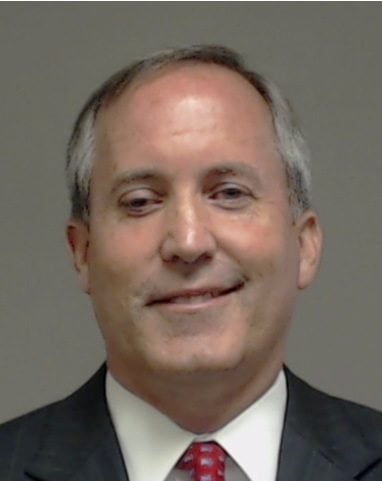
Ken Paxton Just Sent His Dream List of Abortion Laws to the Lege

Following the release of Lieutenant Governor Dan Patrick’s first round of interim charges — which includes a directive to senators that they take a gander at how the Lege might “preserve our most fundamental rights including the freedom of religion, the right to bear arms and freedom of political speech” — Attorney General Ken Paxton followed up with a letter on Thursday detailing his own ideas on how to further restrict access to abortion, regulate abortion providers, limit medical research and generally do more to endanger Texans seeking the procedure.
You can see this laundry list of terrible ideas for yourself.
Where do I even begin? Let’s back up to late July, when senators heard from Paxton (amid his own legal troubles, by the way, as my colleague Chris Hooks has expertly laid out) about his investigation into Planned Parenthood, prompted by the release of undercover, edited videos attempting to show that the healthcare organization is illegally profiting from the sale of fetal tissue. Aside from the political circus that the videos created over the summer, expert analyses have found the footage to be deceptively edited and misconstrued by the anti-abortion group behind the operation. As our digital editor Andrea Grimes explained this week in a Rolling Stone piece, the idea that Planned Parenthood is profiting from “baby parts” is plainly bogus.
But onward to the list. In a letter to Dan Patrick and House Speaker Joe Straus, Paxton explains that his “ongoing” investigation (similar investigations in other states have so far found no evidence that Planned Parenthood is doing anything illegal) has prompted him to lay out “areas where the laws to protect the life and dignity of unborn babies can be enhanced.”
Let’s go in order, shall we?
First, Paxton wants lawmakers to consider prohibiting so-called “partial birth abortions and dismemberment procedures.” Paxton is most likely referring to the surgical abortion procedure known as dilation and evacuation, or dilation and extraction, typically performed at 16 weeks of pregnancy or later. Two other states — Oklahoma and Kansas — have similar bans on the books, and Congress passed a 2003 law that penalizes any physician who “deliberately and intentionally vaginally delivers a living fetus.” In Texas, the D&E surgical method for abortion is rare. In 2013, of the 63,849 abortions performed, only 4,199, or less than seven percent, involved a dilation and evacuation procedure. Aside from “partial birth abortion” not even being a medical term, such a ban on a medical procedure is just another example of state lawmakers making medical judgments from the Capitol.
Paxton’s list also includes a “comprehensive statute” that would ban taxpayer dollars from paying for abortions, except that no state money goes toward paying for abortion services.
Next, Paxton writes in his letter that he wants Texas to take a page from Russia’s playbook and ban abortion at earlier than 20 weeks gestation. Part of Texas’ 2013 House Bill 2 includes a 20-week ban, a restriction that is forcing women and their families to take extreme measures when they need to end later pregnancies. Texas’ law includes an exception to the ban in cases of fetal abnormalities, which is critical for families who are facing tough, sometimes lethal, pregnancies. Ultra-conservative lawmakers tried to eliminate that exception this past session, and you better believe they aren’t done trying.
Paxton’s list also includes a “comprehensive statute” that would ban taxpayer dollars from paying for abortions, except that no state money goes toward paying for abortion services, and hasn’t since 2007, when the Legislature passed what’s known as the “affiliate ban,” prohibiting state money from going to health care entities affiliated with abortion providers (read: Planned Parenthood). Over the last several sessions, the Legislature has written Planned Parenthood’s non-abortion-providing health centers out of all state health programs, compromising access to preventive cancer screenings, contraception, and STD testing for the lowest income Texans. To me, and to women I’ve met all over the state who have struggled to access basic health care amidst the political fight to defund Planned Parenthood, you can’t get more “comprehensive” than that, but it looks like Paxton intends to try.
Paxton’s next bullet point is centered around how fetal tissue is donated, purchased and used in the research field. One line in particular struck a nerve with Darren Boehning, a researcher in the department of biochemistry and molecular biology at the University of Texas Health Science Center in Houston. He caught Paxton’s letter on Twitter, and when I followed up with him by e-mail, he wrote that he believes Paxton’s language — the attorney general would “prohibit state or local government entities from acquiring aborted babies or their body parts” — may impact other fields of research.
“This would prevent state universities such as UT from performing human fetal tissue research,” he wrote. “Research on aborted fetuses (his use of the term ‘baby’ is obviously intentionally inflammatory) is fairly limited and would affect only a small minority of laboratories. However, would surplus in vitro fertilization embryos count as an ‘aborted baby’? If so, this would essentially restrict research on human stem cell lines, which are used by a much, much larger number of laboratories.”
But perhaps one of the most abhorrent ideas on this list is this: Paxton would “require abortion providers to report to law enforcement as potential sexual assault any pregnancy of a minor 16 years old or younger.” Getting a legal abortion as a minor in Texas is already difficult; the Lege made it even harder last session. Now, Paxton wants to call the cops on every teen who walks into an abortion clinic.
Under Texas law, everyone — doctors and abortion providers included — is already required to involve law enforcement, or Child Protective Services, if they have reason to believe a minor has experienced abuse or neglect, and that includes sexual assault.
“We have no information to suggest the current mandatory reporting statute is inadequate to impel medical professionals to report suspected abuse,” wrote Chris Kaiser, an attorney with the Texas Association Against Sexual Assault, by e-mail after he reviewed Paxton’s suggestion.
Under Paxton’s plan, here’s how a scenario like this might play out: If Jane is 16, pregnant and walks into an abortion clinic, the physician would be required, if Paxton got his way, to call law enforcement and report that she had been sexually assaulted without even talking to her first. She might have a parent with her, because she’d need a court order from a judge to obtain an abortion without parental consent. If Jane had in fact been sexually assaulted, Jane might not have told her parent yet, but thanks to Paxton, the physician just did — by picking up the phone.
The final few abortion-related ideas that Paxton pitches involve the regulation of fetal remains. As Department of State Health Services officials told the Senate Health and Human Services Committee this summer, the agency lacks the authority to inspect a facility’s fetal tissue and organ donation practices, but it does oversee the storage and disposal of fetal remains. Paxton wants to give the state health department more power in regulating abortion providers, including allowing the department to issue “closure orders” for inspection violations.
Getting a legal abortion as a minor in Texas is already difficult; the Lege made it even harder last session.
That’s pretty rich considering every anti-abortion law passed in Texas in the last decade has more or less amounted to a “closure order,” not least of all HB 2. I don’t need to remind you that HB 2 has brought the number of abortion providers down to 18 from 41, and if Paxton has his way and the Supreme Court doesn’t take up the ongoing case against HB 2, we’ll be down to nine for the whole state. We know, thanks to new research released this week, that fewer clinics means longer wait times for services and higher costs for patients.
At the July hearing on the videos, which devolved quickly into a Planned Parenthood bashing session, Paxton made his ultimate intentions very clear.
“More than any misdeeds involving the sale of aborted baby parts is a fundamental truth: the true abomination of all of this is the institution of abortion,” Paxton told committee members. “At a minimum, the people involved [in the videos] project a cold, calculating, almost inhumane indifference to the lives they treat as a product they are attempting to sell. At worst, they may represent a violation of state or federal laws. But we should ever lose sight of the fact that as long as abortion is legal in the United States, these types of horrors will continue.”
Though this is just a Paxton wish list for the interim, it’s likely that some, if not all, of these ideas will make up the anti-abortion agenda for the upcoming 2017 legislative session. Texas conservatives have long been on a mission to make abortion illegal in this state, and so far they’ve gotten very close to making it inaccessible for all but the richest among us. Now, Texas’ top legal official is showing us the roadmap for the rest of the way.
Read Paxton’s entire plan below.
Correction: An earlier version of this story incorrectly stated the percentage of abortions performed by dilation and evacuation. The Observer regrets the error.


